Ariana DeBose Talks ‘Kraven The Hunter’, ‘Two And Only’ & Refusing To “Fit In A Box” — Deadline Disruptors
- Oops!Something went wrong.Please try again later.
- Oops!Something went wrong.Please try again later.
- Oops!Something went wrong.Please try again later.

“There is indeed a place for us,” Ariana DeBose said on the Oscar stage back in March. As the first Afro Latina and the first openly queer woman of color to win, she addressed her acceptance speech—for her role of Anita in Steven Spielberg’s West Side Story—to those who have ever questioned their identity and find themselves in “the gray spaces”. In the audience that night the 90-year-old Rita Moreno was in tears. Having played Anita 60 years earlier, she had been the first Latina ever to win an acting Oscar.

More from Deadline
What Makes Tom Cruise's Star Shine So Brightly? Directors Share Their Insights - Cannes Disruptors
Cannes Review: Felix Van Groeningen & Charlotte Vandermeesch's 'The Eight Mountains'
And now DeBose carries that torch forward. A woman who set aside her fears and told Spielberg “no” to reading at the first West Side Story audition because she hadn’t had adequate time to prepare, she was Tony-nominated for her role in Summer: The Donna Summer Musical, lauded for her work on the original cast of Hamilton, and spent a decade on stage before making her name on screen. In Ryan Murphy’s The Prom, she played a closeted cheerleader, drawing on her own experience of dancing with a girl at her prom back home in North Carolina. And afterward, she and co-star Jo Ellen Pellman set up the Unruly Hearts Initiative to support LGBTQ+ youth.
Her upcoming project Two and Only is set to provide yet another fresh take. She’ll executive produce and star in the film, written by Latina and LGBTQ+ writer Jen Rivas-DeLoose with DeBose in mind for the lead.
Deadline Disruptors At Cannes: Read Them All Here
For right now, DeBose is in London shooting her role of Calypso in Marvel’s Kraven the Hunter.
In a conversation via Zoom, she describes how the women in her childhood helped lay the foundation for her unflinching authenticity and her pursuit of projects that leave underrepresented audiences feeling truly seen.
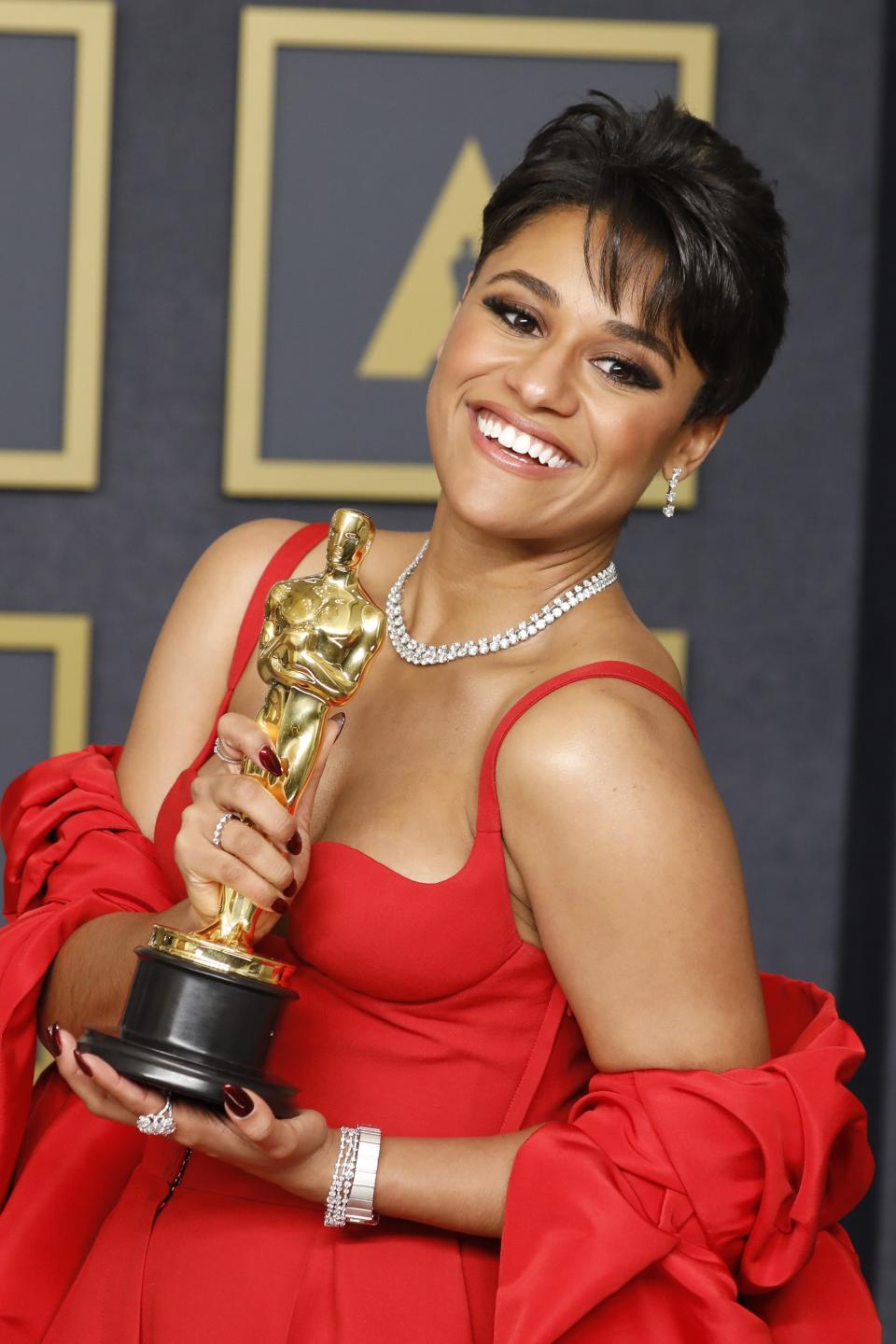
DEADLINE: Looking back on your Oscar speech, how do you feel now?
ARIANA DEBOSE: That moment was really wild. I think I just remember, OK mom. Mom. If I can just hug my mother, everything will be OK. And then I got up there and looked out and realized people were standing and I was just like, “Oh God, please sit down.” And then I realized there was a thing counting me down and I’m like, “But I haven’t said anything I want to say, so get it out.”
I think it might have been one of the most validating experiences of my career, potentially my life thus far, because I was given the opportunity to say what I wanted to say. I was there to represent our film, which I’m incredibly proud of, but I was also representing myself. And it was a culmination of a very long journey. Nobody influenced me. I got to say what was in my heart. And that’s not how it happens for everybody, so I was really grateful for that.
I have seen how young people have reacted to it. It’s not just young people, but I do get a lot of attention from young folks right about now.
DEADLINE: In what way?
DEBOSE: I was headed to an appointment somewhere in London because I’m still trying to figure out what neighborhood I’m in at any given moment. I was walking around. I had a bag of chips because I was hungry, and I was stuffing my face. And these two beautiful, beautiful Black humans were on a bike ride. I hear, “Oh my God. Is that Ariana DeBose?” And I was like, “Am I going to stop? I’m going to stop.” And I turned around and they had stopped and were staring. And the guy’s like, “It is. It is her. You’re mad inspiring, man. Thank you so much.” And the lovely young woman that was with him said, “You’re so lovely. Thank you for everything you’ve done.” And I was just like, what world is this? I’m not in my hometown. I’m in another country. I had sunglasses on. I was eating chips. But that was really cool.
DEADLINE: How is the Kraven the Hunter shoot going?
DEBOSE: It’s cool. It’s going well. I mean, for as much as I believe I’m allowed to say about it, I think it’s going swimmingly.
DEADLINE: It’s exciting that Marvel seems to be really pushing for change.
DEBOSE: Yeah. I’m proud of them. I think all of these franchise pieces, it’s all about your growth. And it’s exciting to be a part of something that feels like it’s taking a step in a different direction. I feel like they’re just allowing this to live in whatever world it needs to live in, which is kind of cool. I don’t like work experiences, period, where I feel like I’m asked to fit a box, because my job is to discover the box and to define the box. That’s my job, in my opinion. I mean, it is 2022.
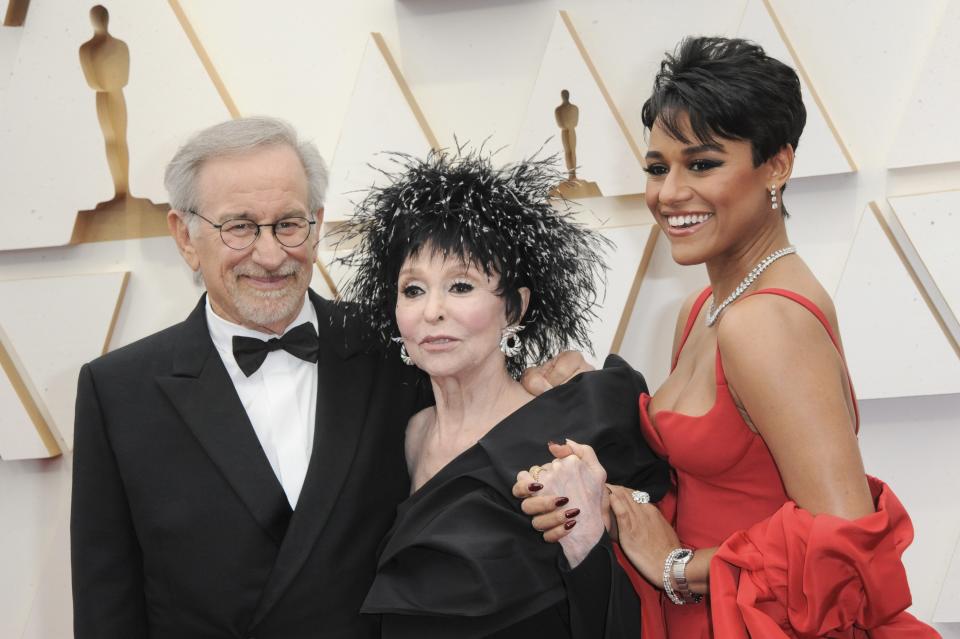
Elizabeth Goodenough/Everett Collection
DEADLINE: And you have Two and Onlycoming up. Is it accurate to say it’s a kind of My Best Friend’s Wedding with a bisexual Latinx point of view?
DEBOSE: That’s kind of what it is, but I like to leave room for things to grow. My Best Friend’s Wedding, that was one of my favorite films growing up. There are a lot of people who say it doesn’t hold up well, but there is something about it that I find so intriguing. It’s that age-old question: she’s running, he’s running after her, you’re running after him, who’s running after you? Nobody.
I really loved Jen’s script because we don’t see stories that are authentically from a bisexual perspective every day. So, I thought it was a really fun opportunity to explore that, and, as an executive producer, to make sure that you’re bringing an accurate voice to the film so that it speaks to more people and have a little fun while doing it.
DEADLINE: At what point did you get involved?
DEBOSE: They came to me. And in fact, it was the first time that ever really happened in my career. And I thought, What? Somebody wrote something with me in mind? Oh my God. It was just a logical, collaborative relationship that formed, and one I’m really excited about. I love [producers Randall Einhorn and Jeremy Stern’s] Sad Unicorn, and all the gang over there. I’m grateful that Sony’s Screen Gems said, “We like the concept.”
The cool thing about this is that, not for nothing, the conversations around this piece were going on before I won an Oscar. That’s what I find so heartening, and I felt this way about Schmigadoon! too, because I shot West Side Story before I shot Schmigadoon! and it’s like West Side Story has given me all this opportunity, but Schmigadoon! came out before it, The Prom came out before it, and I’m laying seeds with Two and Only. I was laying them before anything happened with this award season. So, it’s nice to always have work that you’re constantly working on, regardless of what happens with the special accolades, but to feel like people were taking me seriously before, and now they’re really listening. That’s a very cool moment to sit in.
DEADLINE: You spent 10 years on Broadway, it’s not like you just suddenly appeared, but in the last three years you’ve become a household name in a new way. How does it feel?
DEBOSE: For the longest time, everyone used to be like, “Ariana, like Grande.” And now, it’s like, “No, Ariana DeBose.” I think that’s so cool.
When I left Hamilton, my goal was just to take on work that was more challenging, like, a leading lady, heavily featured role. When West Side Story happened, I was doing Donna Summer, but then that role came along and started this commitment of doing something new. And that’s what the three years has been. Yes, my introduction to film and television really was West Side Story and musicals like Schmigadoon! and The Prom, but it’s a commitment to a different medium. So, I have felt like the chapters of my life shifted in such a way where it’s finding where your commitment lies. I commit per project, but there are seasons of one’s career. I seem to be in a season at the moment where the work that is calling to me most is in film or television, but that doesn’t mean that I’m not planting seeds for something that I might want to do in a different season on stage. I believe in planting seeds.
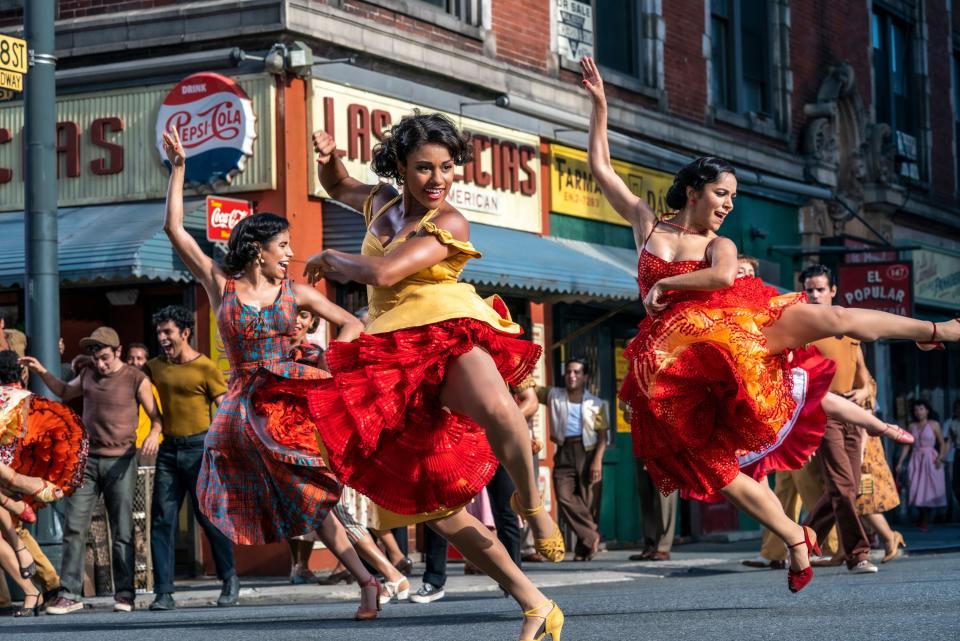
Nico Tavernise/20th Century Studios/Courtesy Everett Collection
DEADLINE: Now that you’ve begun executive producing, are you going to create a production company empire?
DEBOSE: Oh, I mean, I think there are some great examples of women who have done that. When I was first in LA, making The Prom, it turned out that was the time when my team was shifting. I was doing what actors do, taking meetings with different agencies. And it was fascinating because I felt like everyone was trying to figure out, what’s Ariana going to jump for? My manager, who is still my manager to this day, Anthony [Calamita], we always talked about me having an empire state of mind. I don’t just do one thing. I really love people and I believe in philanthropy and advocacy. I like finding products that are actually good for people. So, when I was taking these meetings, I was looking for a home that would allow me to essentially build some sort of empire. I think it’s funny that you used that word, because I do believe in doing multiple things. And perhaps, one day, I will have to create an umbrella company.
DEADLINE: These things often have their own momentum.
DEBOSE: They happen naturally. Well, isn’t that Hollywood though? Things just start rolling and you can’t really stop them. It becomes like a movement that is bigger than you in a way. That’s what I think I’m learning. There are so many things that I’ve experienced that are so much bigger than me, but I’m like a vessel or a catalyst. It’s the ability to not make it about you. I think those that I’ve witnessed that are most successful in their mission or their purpose, they have the ability to not make it about them.
DEADLINE: Humility is so important and quite rare, I hate to say.
DEBOSE: I tend to agree with you. There’s something about acting. Acting isn’t about me, dance isn’t about me, singing is not about me. It’s about the storytelling and the people. It’s about the community. It’s about what I’m hoping to bring voice to.
Judith Light always said to me, “Find a way to be of service. How can the work be of service?” And that’s been a real moral compass for me.
DEADLINE: Your choice of projects has reflected that. When The Prom was released, you talked about how, like your character Alyssa Greene, you yourself had danced with a girl at your own prom. What were your conversations with Ryan Murphy going into that? Taking that role had to feel like a personal choice.
DEBOSE: Oh yeah. It was a real personal choice. And it was a delicate time as well because I was finishing making West Side Story. I think there were powers that be that were encouraging me to lay low and wait for things to work themselves out. And I’m very intuitive. I felt in my bones that I needed to do this, or maybe it was for some sort of healing for a younger version of myself…
Young, Black, queer-identifying women, or those that are curious and questioning — I’m talking about high-schoolers — they don’t get to tell their story. And I think there were a lot of things that were misconstrued around [me saying] that. I was never and have never said, “Oh, but my Alyssa Greene is the only queer interpretation that is accurate or that we’ve seen,” because it’s not true. But what made that Alyssa Greene special was that it’s not every day that you get to hear from a young, female perspective about her queer journey.
I think we’ve gotten really good at telling the young boys’ perspective perhaps. It’s the more common story we talk about for a myriad of different reasons. But Alyssa and Emma were so special because it was two lived experiences from the queer perspective, questioning perspective, gay, lesbian perspective, both by young women. And I wasn’t sure — I’m still not sure — if that point actually was received. But that’s why I wanted to take the job.
Ryan spoke with Jo Ellen and I frequently about our lived experiences. And he actually asked me, the first time I met him, what I thought about making [Alyssa’s mom] Mrs. Greene a Black woman. I said, “Well, if you hire me, you probably have to, but I think you should because there’s a conversation to be had within the Black community around this.” He said, “But Ariana, do you think it makes her a villain?” I love Ryan. But he was very concerned that it would be bad to make a Black woman a villain in this case. I was like, “I don’t think that’s what this is. You’re asking a Black woman to play a mother. And at the end of the day, no matter what choices she makes, she’s making the choices that she believes are in the best interest for her child. And sometimes that means parents are blindsided by their own bias.” And then the next thing I knew, I had the job. I guess being honest is helpful.
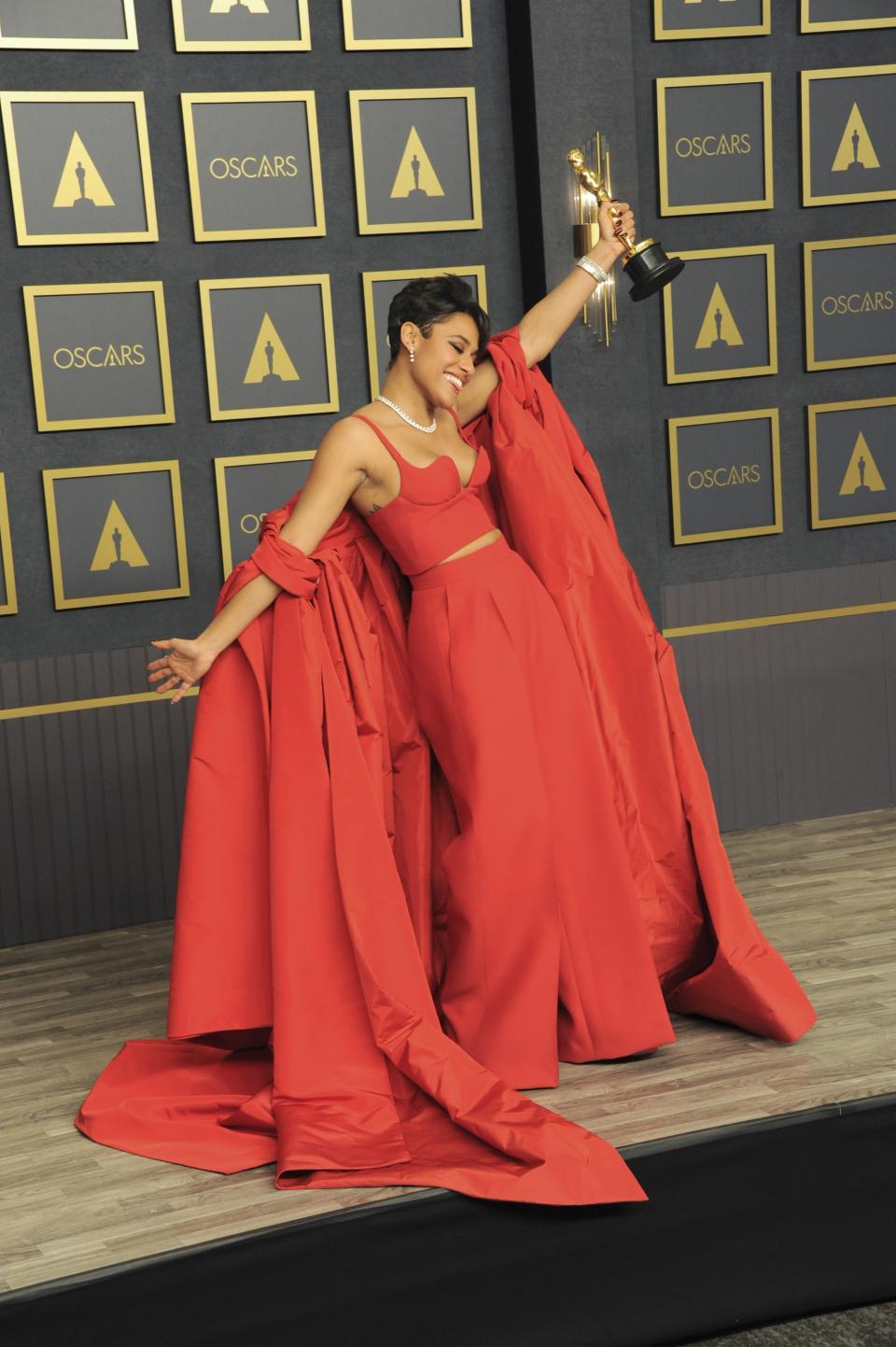
Elizabeth Goodenough/Everett Collection
DEADLINE: The story you told around the audition for West Side Story, where somebody had forgotten to tell Spielberg you’d arranged not to read on the first round, since you hadn’t had time to prepare, so you told him no. I’m always fascinated by people who must be authentic and stand by themselves and their needs. What in your life imbued you with that ability?
DEBOSE: I do think that there is a part of me where that character trait is just inherent to who I am, but I was raised by a community of really strong women. My mom is an incredibly strong woman who raised me as a single parent. And my grandmother was also heavily involved in my childhood, my mom’s sister, my aunt.
My mother is a teacher as well. I was born in Wilmington, but we moved to New Bern, North Carolina, which is a very small town. And the teachers that were working with my mother were also very influential in my formative years because I was raised by a village of really strong, independent women with varied opinions. They were all a really great example as to how to walk through the world as a woman with your strengths, your flaws, your opinions. I saw great examples of knowing when to admit that you’re going to lose this battle, but you’re going to win the war, how to admit you’re wrong, how to apologize. That’s been very helpful in my adulthood. How to just be like, “I don’t know. I know nothing. Yikes.” But I think it probably comes from their example.
I had the benefit of many examples of femininity. And I think I don’t know how to be anything but myself because I was always encouraged to be myself. There have been a lot of people who have questioned my upbringing.
DEADLINE: What do you mean questioned your upbringing?
DEBOSE: Well, because I’m a lovely Black woman. I’m a mixed chick. And I was raised by my mom. My mom’s white, and my mom’s family’s white. And so, they’re like, “But how could… How did you… Were you not raised to see color?” A lot of people don’t like that phrase, “Oh, I don’t see color. I wasn’t raised to see color.” And it’s not really a black-and-white thing. You can’t narrow down that lived, experienced experience to a phrase.
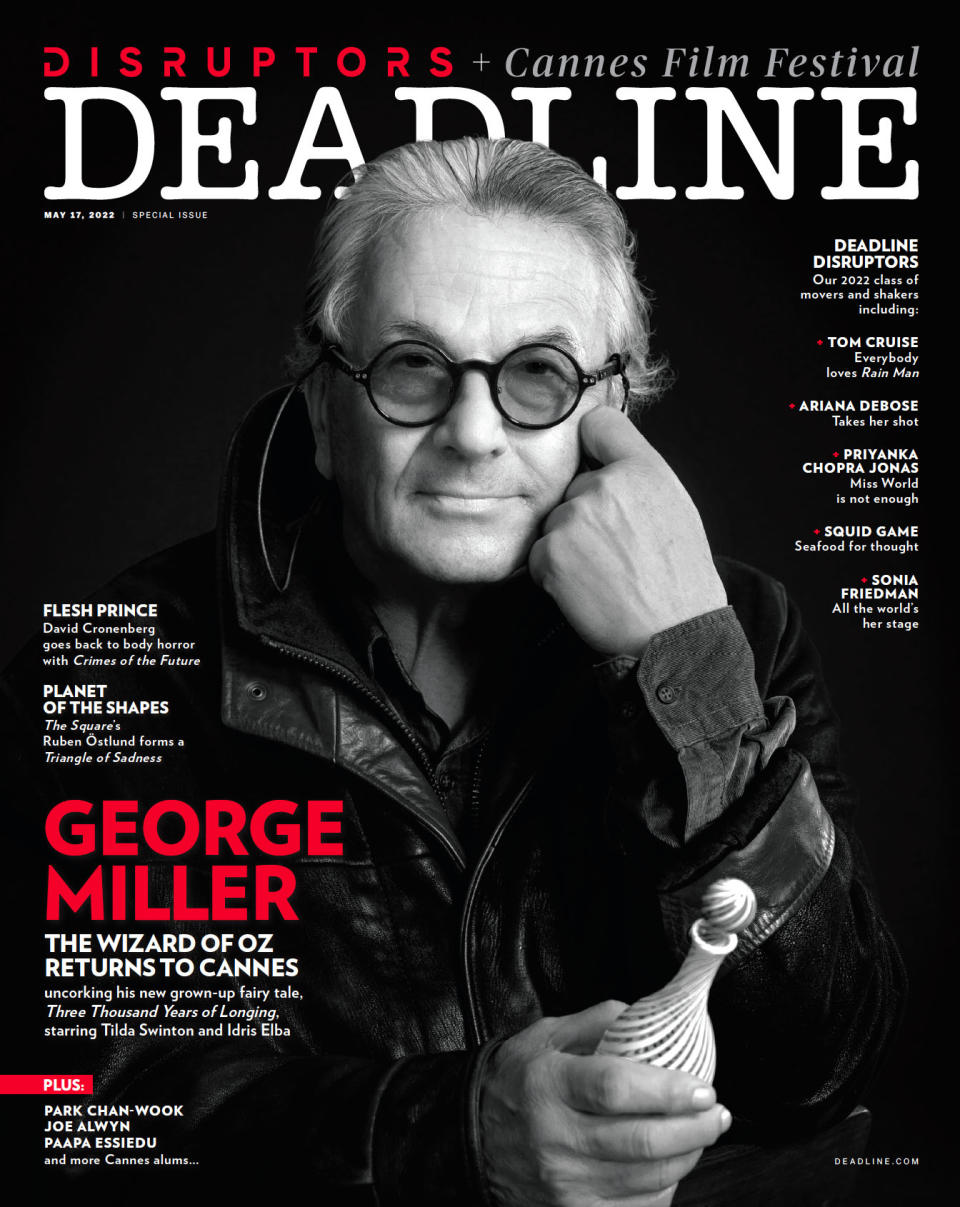
I was raised by a group of people who taught me that I had possibility and that if I worked really hard and was determined and put in the effort every day, I could accomplish anything I wanted. That doesn’t mean it didn’t come with challenges. At some point, yeah, you do realize you don’t look like anybody else surrounding you. That’s sort of inevitable. But it’s how each of those moments was handled that shaped me into a person who tries. I try every day to lead with love and compassion and a sense of positivity. I think I was raised to see people and their potential for goodness, if that makes sense.
DEADLINE: What’s your vision of what you want to achieve moving forward?
DEBOSE: I just want to make work that calls to me, that I enjoy doing, that I have fun doing. And I just want to tell stories that I believe can be impactful in some way, and not focused on genre and not focused on the A-list of directors. I’m not focused on that because, for me, I find that to be a bit superficial. I am focused on what I’m signing up to do, and if I have synergy and chemistry and creative inspiration with the people already signed up.
I think the great benefit of West Side Story was that Steven chose me and he taught me that it’s all about the family you create to make the work with. The work is only good when you feel safe with the people that are surrounding you. That’s what I’m looking to do. That doesn’t mean I won’t make a couple of duds here and there. In fact, I think I might. But damn it, they’re my duds and I’ll be proud of them.
And if I’m lucky, I will get to be Judi Dench’s age and I will still be making work. She’s the dream.
Sign up for Deadline's Newsletter. For the latest news, follow us on Facebook, Twitter, and Instagram.

